|
|
|
Sort Order |
|
|
|
Items / Page
|
|
|
|
|
|
|
| Srl | Item |
| 1 |
ID:
072177
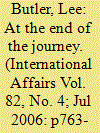

|
|
|
| 2 |
ID:
138258
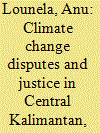

|
|
|
|
|
| Summary/Abstract |
In 2010, the province of Central Kalimantan in Indonesia was established as a Climate Change pilot province to reduce emissions from deforestation and through peat land forest rehabilitation. Today, international agencies, carbon traders, local and national governments, non-governmental organisations, and local populations have participated in debates and disputes over the establishment of carbon forests and forest protection areas in Central Kalimantan. One such scheme, promoted by the government of Australia (Kalimantan Forest and Climate Partnership), intended to establish a REDD+ pilot project within an area that covers about 120 000 hectares in Kuala Kapuas in Central Kalimantan, the field location of this research. This specific dispute offers a case study based on ethnographic research that helps to illustrate how widespread climate change debates and disputes become embedded at local and national levels in Indonesia. The dispute over REDD+ will be discussed within a framework of dispute theories which focus on moments of crisis, wherein participants must present arguments and justify their actions and theories of justice. The article shows that competing and conflicting conceptions of justice that emerge in the dispute may bring to a halt a climate change pilot project in the locality.
|
|
|
|
|
|
|
|
|
|
|
|
|
|
|
|
| 3 |
ID:
151652
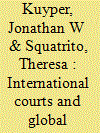

|
|
|
|
|
| Summary/Abstract |
In a post-Cold War era characterised by globalisation and deep interdependence, the actions of national governments increasingly have an effect beyond their own territorial borders. Moreover, key agents of global governance – international organisations and their bureaucracies, non-state actors and private agents – exercise pervasive forms of authority. Due to these shifts, it is widely noted that world politics suffers from a democratic deficit. This article contributes to work on global democracy by looking at the role of international courts. Building upon an original dataset covering the 24 international courts in existence since the end of the Second World War, we argue that international courts are able to advance democratic values and shape democratic practices beyond the state. They can do so by fostering equal participation, accountability, and public justification that link individuals directly with sites of transnational authority. We contend that the ability of international courts to promote these values is conditioned by institutional design choices concerning access rules, review powers, and provisions regarding judicial reason-giving. We canvass these design features of different international courts and assess the promises and pitfalls for global democratisation. We conclude by linking our analysis of international courts and global democratisation with debates about the legitimation and politicisation of global governance at large.
|
|
|
|
|
|
|
|
|
|
|
|
|
|
|
|
| 4 |
ID:
168968
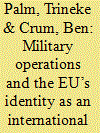

|
|
|
|
|
| Summary/Abstract |
For long, its lack of military means served to single the European Union out as a “civilian” or “normative power”. However, since 2003 twelve EU military operations have been launched. On the basis of a comprehensive analysis of all EU military mission so far, this article seeks to establish how these missions have evolved over time and how they have affected the character of the EU as an international actor. For this purpose, the article outlines four ideal-typical conceptions of the EU's international identity and operationalises them along two underlying dimensions: justification (the purpose of military operations) and policy-embeddedness (the coordination between military means and other foreign policy instruments). Analysing the military operations along these two axes, the article suggests that the EU has been evolving towards a “Liberal Power” identity, as is reflected in a shift from value-based to utility-based justifications, while military operations have at the same time become more embedded in the EU's overall foreign policies.
|
|
|
|
|
|
|
|
|
|
|
|
|
|
|
|
| 5 |
ID:
132523
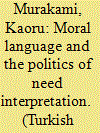

|
|
|
|
|
| Publication |
2014.
|
| Summary/Abstract |
Liberal modernists have claimed that democracy requires participation by interested parties in the politics of need interpretation. Poor people, an interested party, may lack the rational and critical language essential for the process of interpretation. This paper discusses a different perspective on the language of participation by the poor. Focusing on the everyday practices of the poor and using information collected from ethnographic research in Sultanbeyli, a low-income district in Istanbul, Turkey, it is shown how discursive power constrains the language and the manner of talking that the poor use to articulate their needs. The people in the district, "former villagers bound to the Anatolian tradition" using religious morality as a justification of their demands, successfully negotiate with administrators of social assistance programs, thus participating directly in the politics of need interpretation.
|
|
|
|
|
|
|
|
|
|
|
|
|
|
|
|
| 6 |
ID:
134992
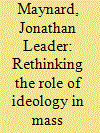

|
|
|
|
|
| Summary/Abstract |
There is a widespread sense amongst theorists of genocide and other violent atrocities that ideology matters. But in spite of this agreement all is not well with actual efforts to theorise ideology's role. Theoretical and empirical coverage has been uneven, and there has been little if any effort to incorporate theories and research from the actual specialist field of contemporary ideology studies. As a result, overarching theoretical accounts of the role ideology plays in violent atrocities remain limited and problematic. This article aims to encourage theorists to think about ideology in a more systematic and productive fashion by analysing four questions: (a) what do we mean by ideology?; (b) who, in cases of atrocity, might be relevantly affected by ideology?; (c) how do these people come to be influenced by atrocity-justifying ideologies?; and (d) how might ideology encourage these people to commit, or permit, mass violence? In discussing these four questions, I aim to clear up a number of misconceptions or vagaries that frequent current analyses of ideology in works on atrocity and political violence. I ultimately offer a suggestive account of six recurring “justificatory mechanisms” which collectively describe some of the common features of ideology's role across cases of mass atrocity.
|
|
|
|
|
|
|
|
|
|
|
|
|
|
|
|
| 7 |
ID:
057438
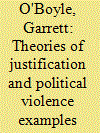

|
|
|
|
|
|
|
|